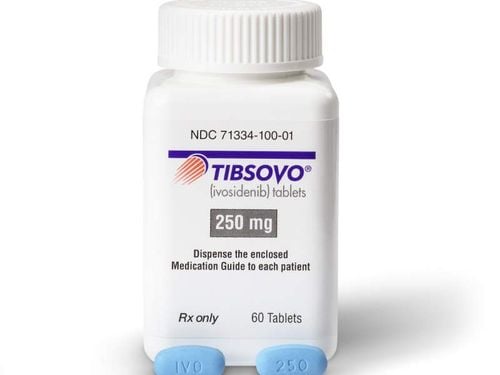This is an automatically translated article.
Azacitidine containing the active ingredient Azacitidine is indicated in the treatment of myelodysplastic syndromes, acute myeloid leukemia, chronic myeloid leukemia, certain forms of bone marrow cancer and blood cell disorders. Let's learn about the uses and notes when using Azacitidine through the article below.
1. Uses of the drug Azacitidine
Azacitidine medicine contains the active ingredient Azacitidine is made in the form of tablets and powder for suspension for injection. Azacitidine works to stop the growth and spread of cancer cells in the body. Azacitidine is indicated in the following conditions:
Moderate and high-risk myelodysplastic syndrome on the international prognostic scoring system (IPSS); Chronic myelomonocytic leukemia without myeloproliferative disorders; Acute myeloid leukemia (20–30%) blast cell and polyclonal dysplasia; Acute myeloid leukemia with more than 30% blast cells.
2. Dosage of the drug Azacitidine
Uses of Azacitidine indicated in the treatment of some cancers, the dose depends on the specific pathology, the patient's tolerability and prescribed by the doctor. The specific recommended dosage of the patient is as follows:
For adults:
Treatment of myelodysplastic syndrome: The dose of Azacitidine in the first cycle is 75mg/m2 subcutaneously or daily infusion for 7 days. days, the cycle is repeated after 4 weeks. After 2 cycles of treatment, the dose may be increased to 100 mg/m2 in the absence of adverse effects and toxicity other than vomiting and nausea. The minimum duration of treatment with Azacitidine is 4-6 cycles; Treatment of acute myeloid leukemia: The dose of azacitidine is similar to that used in the treatment of myelodysplastic syndromes. The dose should be adjusted in case of hematologic toxicity in patients starting treatment when the levels of white blood cells ≥ 3000/mm3, ANC ≥ 1500/mm3 and platelet count ≥ 75,000/mm3 respectively. . For children: Efficacy and safety have not been established in children under 16 years of age.
Other subjects:
Elderly people: There is no difference in dose and drug efficacy compared with young people. Therefore, there is no need to adjust the dose of azacitidine in the elderly. Patients should be assessed periodically for renal function, because the drug and its metabolites are eliminated by the kidneys, elderly patients are at high risk of decreased renal function; Renal Impairment: Patients with renal impairment who have elevated serum creatinine and BUN levels should delay the next cycle until these values return to normal or initiate a 50% dose reduction in the next course. Patients with severe renal impairment are not affected by subcutaneous administration of the drug. Therefore, the drug can be used in patients with renal failure without the need to adjust the dose according to cycle 1; Hepatic impairment: Azacitidine has the potential to cause hepatotoxicity in patients with pre-existing severe liver failure, so caution should be exercised when using Azacitidine in these subjects.
3. Side effects of the drug Azacitidine
Azacitidine can cause some side effects as follows:
Common: Anemia, nausea, vomiting, thrombocytopenia, fever, fatigue, diarrhea, constipation, erythema at injection site, leukopenia glomerulonephritis, asthenia, hypokalemia, petechiae, decreased appetite, musculoskeletal pain, arthralgia, respiratory tract infection, sepsis, cellulitis, urinary tract infection, pharyngitis, sinusitis, skin infection, bone marrow failure, thrombocytopenia; Uncommon: Pericarditis, hypersensitivity reactions, progressive hepatic coma, renal tubular acidosis, pyoderma gangrenosum, heart failure, atrial fibrillation, cardiac arrest, congestive heart failure, congestive cardiomyopathy; Rare: Interstitial pneumonia, tumor lysis syndrome, injection site necrosis; Frequency not known: Necrotizing tissue inflammation.
4. Notes when taking Azacitidine
4.1. Contraindications Contraindicated to use Azacitidine in the following cases:
Patients are allergic to Azacitidine or to any ingredient of the drug; Patients with advanced malignant liver tumors; Women who are breastfeeding. 4.2. Patients should have liver function tests, serum bicarbonate and serum creatinine before treatment with Azacitidine. A complete blood count prior to treatment should be performed to monitor drug response and toxicity. Patients should be given antiemetic prophylaxis prior to treatment with azacitidine. Treatment with Azacitidine may cause neutropenia, anemia and thrombocytopenia (especially during the first 2 cycles of treatment). Abnormalities in renal function (tubular acidosis, increased serum creatinine), renal failure and even death have been reported rarely in patients treated with parenteral azacitidine in combination with other antineoplastic agents. Patients with a history of congestive heart failure, heart disease, or clinically unstable lung disease have not demonstrated safety and efficacy in treatment. Pregnant women: Azacitidine has the potential to harm an unborn baby, causing teratogenicity and embryo death. Therefore, patients should ensure that they are not pregnant before and during treatment with Azacitidine. Lactation: There are no studies demonstrating the ability of azacitidine to be excreted in breast milk, so patients should discontinue breast-feeding during treatment with the drug. Driving and using machines: Azacitidine affects the ability to drive and use machines. Therefore, patients need to be careful in these cases.
5. Azacitidine drug interactions
Azacitidine may interact with some of the following drugs:
Azacitidine enhances the myelosuppressive effect of Lipegfilgrastim when used concurrently. The risk of side effects from Azacitidine is increased with concomitant use of the following drugs: Etanercept, Peginterferon alfa-2a, Interferon alfa-n1, Interferon alfa-n3, Peginterferon alfa-2b, Anakinra, Interferon gamma-1b, Interferon Alfa-2a, Aldesleukin. Azacitidine is indicated for the treatment of myelodysplastic syndromes, acute myeloid leukemia, chronic myeloid leukemia, certain forms of bone marrow cancer and blood cell disorders. To ensure effective treatment and avoid side effects, patients need to strictly follow the instructions of the doctor and medical staff.
Follow Vinmec International General Hospital website to get more health, nutrition and beauty information to protect the health of yourself and your loved ones in your family.
Please dial HOTLINE for more information or register for an appointment HERE. Download MyVinmec app to make appointments faster and to manage your bookings easily.













